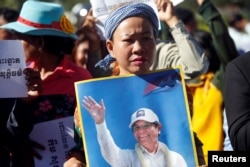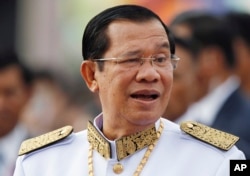An NGO founded by Cambodia’s jailed opposition leader Kem Sokha is set to become the latest casualty of Prime Minister Hun Sen’s ongoing campaign to crush critical voices in his country.
Sokha’s Cambodia National Rescue Party has already been dissolved and its senior members banned from politics, but the premier’s assault on critics shows no sign of abating.
A claimed foreign revolutionary conspiracy plot that has been used to jail, threaten and outlaw government critics far and wide was dragged out by Hun Sen again on Sunday.
The Cambodian Center for Human Rights (CCHR), which was founded by Sokha in 2002, must close because it is deemed a front for nefarious foreign meddling, Hun Sen told garments workers. “In fact, the Cambodian Center for Human Rights should be shut down because it follows order from foreigners. It is because foreigners created it, not Khmer,” he said.
CCHR Response
Calls to the phone of CCHR President Chak Sopheap went unanswered Monday.
In a statement released Sunday, CCHR said it was “one of the very few groups in Cambodia which has faced backlash from both the ruling party and the opposition as a result of its principled criticism of their policies, actions or rhetoric.” CCHR firmly believes that any independent and impartial investigation into CCHR would find no wrongdoing whatsoever on the part of the organization,” the statement read.
“CCHR calls upon the Royal Government of Cambodia to enter into a meaningful dialogue with CCHR representatives in relation to these allegations, in the firm belief that any misperceptions about the nature of CCHR’s work and neutrality could be clarified, and the matter resolved.”
The statement also pointed to the diversity of CCHR’s programs, including human rights education, the empowerment of rural communities affected by land disputes and the promotion of LBGT equality.
Former CCHR president, Ou Virak, said the conspiracy plot was hard for the public to believe as most viewed the West favorably, while the government’s cozy relationship with Beijing hurt its credibility when alleging foreign interference.
“It looks to be desperate measures to hold onto power, but I think every time he shuts down an NGO like CCHR for example he’s basically going to draw more criticism and frustration from the Cambodian public,” he said.
“It’s interesting to see why he would want to do that now. Strategically it doesn’t make any sense to shut down and organization like CCHR.”
Spokesman Sok Eysan of the ruling Cambodian People's Party (CPP) told VOA concern from human rights groups over the targeting of CCHR was itself an expression of foreign support for the now dissolved opposition party.
“I think that it’s not relevant to Cambodia’s independence and sovereignty, so that we can’t accept what they said - meaning that Cambodia is an independent and sovereign Cambodia,” he said. “And as for the possibility of reviewing the Cambodian Center for Human Rights, we must clearly check the facts and legal bases. If the facts and legal bases prove that it is obviously guilty, we can’t keep it,” he added.
Crackdown spreads
Naly Pilorge, director of rights group Licadho, said the threat of closure was being coupled with a raft of other intimidatory measures such as an August 4 Ministry of Interior directive to provincial authorities to make sure NGOs notified them of “any activities” they were conducting.
“You know even if we’re not closed, and most NGOs are not, the environment is so difficult, there’s so much restrictions not just on what we say but also what we do. I mean that affects the entire society so it’s quite serious,” she said.
Not only are NGOs being targeted, but journalists and even everyday citizens are being thrown in prison for comments they posted on Facebook, she said.
Two journalists, Yeang Sothearin and Oun Chhin, were charged this month for allegedly continuing to work for Radio Free Asia after it shut its offices in Phnom Penh in early September - actions the Cambodian courts determined amounted to espionage.
In a statement, Human Rights Watch said the Cambodian government’s attacks on the opposition, independent media and human rights groups were “nearing the point of no return”.
“The United States and the European Union have threatened action in response to the crackdown, but should do more,” the statement said.
“Cambodia’s donors and trade partners, including Australia and Japan, should also impose targeted sanctions, including asset freezes and travel bans, on Hun Sen and senior members of the CPP and armed forces.”
Kem Sokha was jailed on September 3 for alleged treason and is still awaiting trial. He left CCHR in 2007 to pursue his political career, initially as the head of the Human Rights Party.






